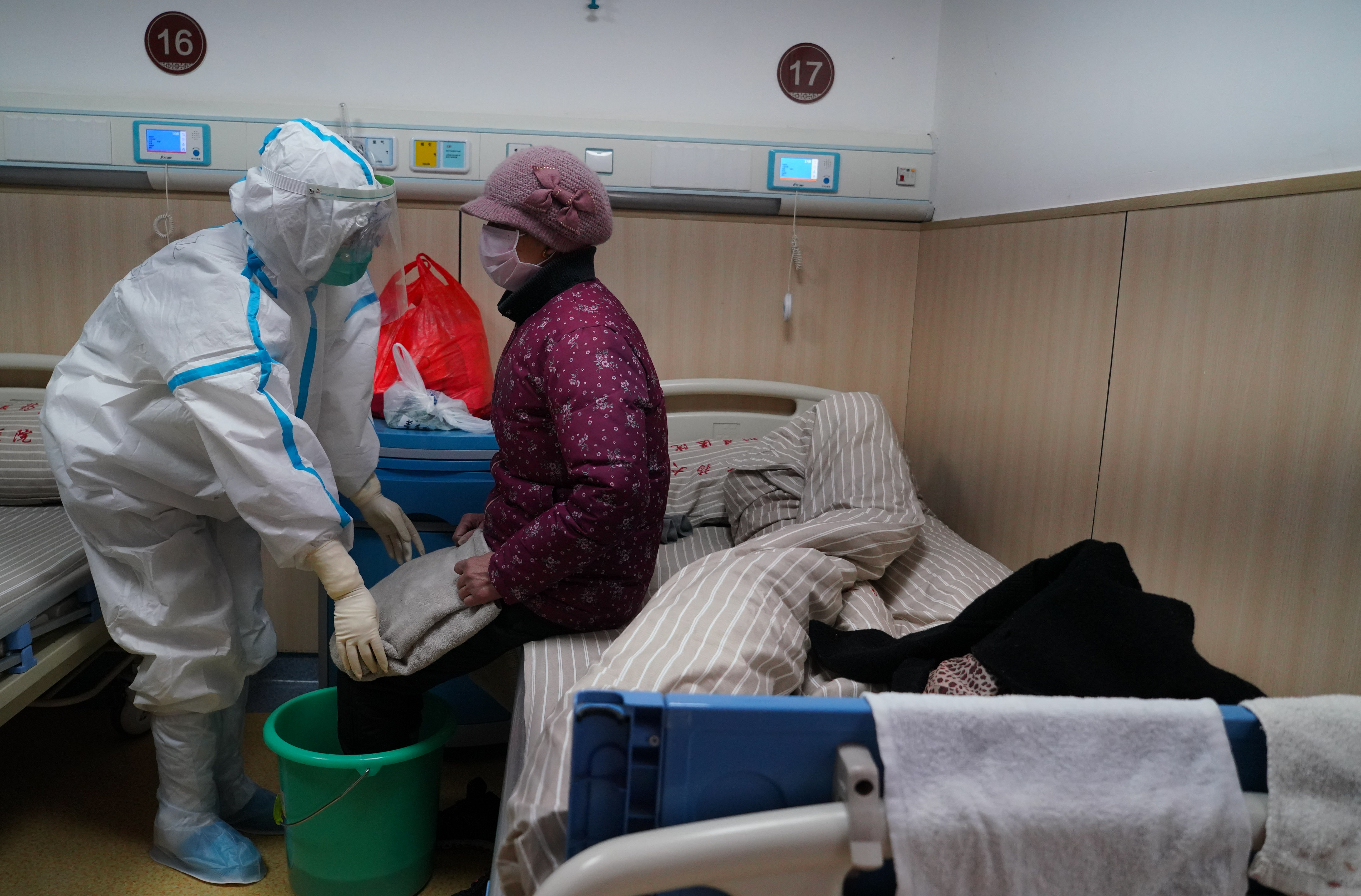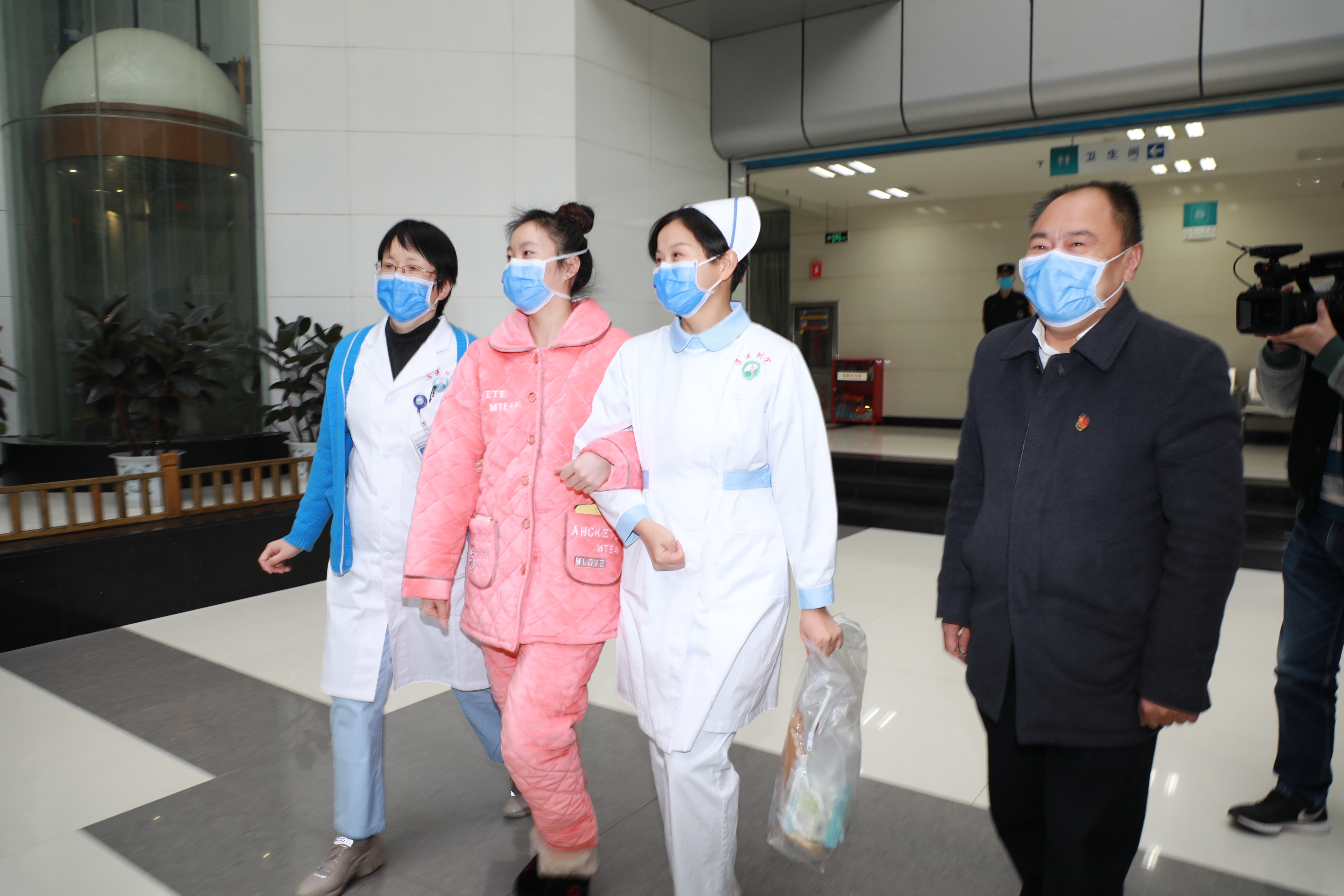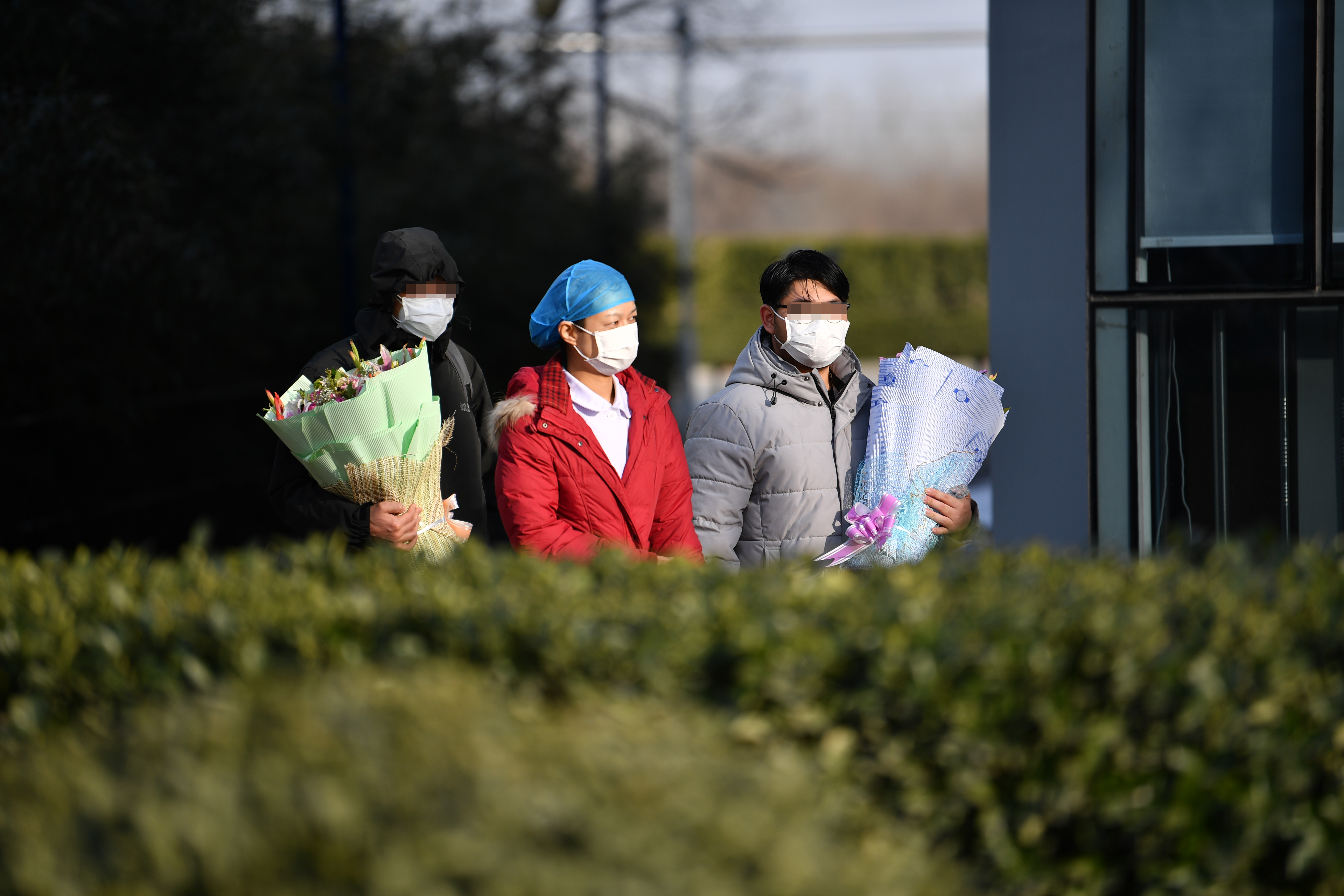As a rising number of patients infected with the novel coronavirus (COVID-19) have recovered and been discharged from hospitals in China, it is believed to be of great significance to scrutinize diagnosis and treatment plans, summarize experience in those cured cases, and share such information in a timely manner among various parties.
Xinhua journalists have interviewed 18 recovered patients in 13 provincial-level regions in China, summing up several commonalities from their diagnosis and treatment experiences.
by Xinhua writers Xu ruiqing, Xiong Lin, Shi Qingwei, Liu Yide, Li Kun
BEIJING, Feb. 23 (Xinhua) -- Nearly 23,000 patients infected with the novel coronavirus (COVID-19) have so far recovered and been discharged from hospitals in China as the country makes progress in its fight against the epidemic.
It is believed to be of great significance to scrutinize diagnosis and treatment plans, summarize experience in those cured cases, and share such information in a timely manner among various parties, in an effort to intensify medical treatment capability and effectively assist in epidemic prevention and control across the country.
Xinhua journalists have interviewed 18 patients (some using only surnames for privacy) recovering from the coronavirus in 13 provincial-level regions in China, summing up several commonalities from their diagnosis and treatment experiences.
EARLY DIAGNOSIS, TREATMENT
Early identification, reporting, isolation, diagnosis, and treatment is one of the best and most effective ways to contain pneumonia caused by the novel coronavirus.
"I went to the hospital immediately after I had a fever, and was soon diagnosed with COVID-19," said a patient in north China's Tianjin Municipality.
With intensive media coverage of the situation, the public has been aware of the urgency. "Therefore, I went for an examination immediately after symptom onset," the patient added. "I did the right thing as it helped me win very precious time for timely treatment."

A patient receives a foot bath treatment in a bucket of decoction at an isolation ward of the Affiliated Hospital of Jiangxi University of Traditional Chinese Medicine in Nanchang, east China's Jiangxi Province, Feb. 18, 2020. (Xinhua/Hu Chenhuan)
A 35-year-old resident surnamed Tang in east China's Shandong Province, returned to her hometown from Wuhan, the epicenter of the epidemic, on Jan. 22, one day before the megacity, with a population of over 10 million, decided to close all channels of leaving Wuhan to curb the spread of the deadly pathogen.
"I knew the situation in Wuhan would become worse," Tang recalled. "On Feb. 23, I went to the hospital in my hometown and was confirmed to be infected with the virus."
"Thanks to the early diagnosis, my symptoms were eased a lot after four days of treatment in hospital, and I was finally cured," said Tang.
COMBINATION OF TCM, WESTERN MEDICINE
Clinical experience has repeatedly proven that traditional Chinese medicine (TCM) combined with Western medicine plays an active and effective role in the treatment and recuperation of coronavirus patients.
TCM and Western medicine have their respective focuses and complementary strengths in treating the novel coronavirus, according to Zhang Boli, an academician with the Chinese Academy of Engineering.
Western medicine offers important life-supporting measures such as respiratory and circulatory assistance, while TCM focuses on improving patients' physical conditions and immune function, said Zhang.

Medical staff work at a traditional Chinese medicine pharmacy in Weinan City, northwest China's Shaanxi Province, Feb. 20, 2020. (Xinhua/Tao Ming)
Hu Yaqi, a 26-year-old resident in Wuhan, was confirmed to be infected with COVID-19 on Jan. 24 when she passed by north China's Inner Mongolia Autonomous Region during her train trip. She received the integrated treatment of TCM and Western medicine during her 14-day hospital stay.
Ding, a university student, took two doses of TCM targeting fever, coughing and vomiting twice a day when receiving treatment at the Sixth People's Hospital of Shenyang, capital of northeast China's Liaoning Province.
"I felt better a couple of days later. The TCM prescription helped a lot in improving my physical conditions and immune function," said Ding, who was cured and discharged from hospital on Feb. 9.
Among the 22 recovered patients in the hospital, over 80 percent received the combined treatment of TCM and Western medicine, according to Yu Hong, an attending doctor with the hospital.
Nationwide, over 75 percent of COVID-19 patients are receiving TCM treatment in Hubei and over 90 percent in other parts of China.
STRONG MEDICAL SUPPORT
Strong medical resource support, including excellent medical teams, specific treatment schemes, as well as timely psychological counseling, have been provided for these confirmed cases.
After Li, a 46-year-old teacher in north China's Shaanxi Province, was admitted to hospital on Jan. 28, a medical team consisting of intensive care, infectious and TCM medicines was immediately set up, and a specific treatment plan was quickly formulated.
To quell her fear of the unknown, psychological health services were offered.
"Once we are emotionally unstable, psychological consultants and medics will come to talk with us and cheer us up," said Ma Lian, who was hospitalized with her three family members in northwest China's Qinghai Province in late January.

The patient recovered from COVID-19 poses for a photo with health workers before her discharge from a hospital in Erdos, north China's Inner Mongolia Autonomous Region, Feb. 5, 2020. (Xinhua)
The emotional stability of patients helps in the fight. The psychological counseling offers comfort for those infected and reduces their spiritual burden, according to Drolma, deputy head of the Fourth People's Hospital of Qinghai.
To date, China has opened mental health hotlines for people who need help with psychological issues related to the epidemic. More such telephone- and internet-based counseling services have also been established across the country.
"Trying to stay strong in mind, only in this way can you win the fight against the 'epidemic demon,'" said the recovered patient from Tianjin.
TRUST AND COOPERATION
"I almost had a nervous breakdown when I was diagnosed with the deadly COVID-19," said Su Ya, a university student who was cured at a designated hospital in southwest China's Guizhou Province. "Looking back, I was very grateful for those medical workers who helped me survive the hard time."
Su was the first confirmed case in the city of Zunyi in Guizhou. The Affiliated Hospital of Zunyi Medical University quickly set up a medical team composed of critical care, respiratory, infectious, and TCM medicines to better provide medical treatment for her.

Health workers escort a recovered COVID-19 patient (2nd L) leave the Affiliated Hospital of Zunyi Medical University in Zunyi, southwest China's Guizhou Province, Feb. 8, 2020. (Photo by Wang Hong/Xinhua)
Seven doctors and dozens of nurses worked non-stop to take good care of Su. "She trusted us and was very cooperative with our treatment plan, which also gave us great confidence," said Ouyang Yao, a respiratory physician at the hospital.
"Those medical workers deserve our heartfelt gratitude. I felt at ease having them around in the hospital," smiled Hu, the cured patient in Inner Mongolia.
"Our common enemy is the novel coronavirus. The doctors and nurses fighting on the frontline risk their lives to help us. The least we can do is to give them trust and stand with them," said the 46-year-old teacher in Shaanxi.
EMOTIONAL SUPPORT OF FAMILY, FRIENDS
Yang and her 22-year-old daughter were both confirmed to be infected with COVID-19 on Jan. 24 in Liaoning.
While many hospitalized patients were separated from their families to reduce the risk of infecting them, medics try to keep a family of patients staying together so that they can spiritually support each other during the treatment.
"The hospital arranged my daughter and me to stay in one ward so that we could accompany and encourage each other," said Yang. They were admitted to the Sixth People's Hospital of Shenyang, and both were discharged from the hospital on Feb. 9.

A health worker (C) escorts two recoverd COVID-19 patients leave Tianjin Haihe Hospital in Tianjin, north China, Feb. 8, 2020. (Xinhua/Li Ran)
"I love you. Do not be afraid and stay strong," Li, the teacher in Shannxi, cried when she received a WeChat message from her elderly teacher. Also, Li's students and their parents also texted messages and made phone calls to encourage her.
"My classmates donated money to me. Everyone cares about me," Li was very touched. "Their support motivated me to pull through."
At the First Affiliated Hospital of Zhejiang University in east China's Zhejiang Province, Li also shared a ward with her husband. It only took her four days to recover.
"I have trust in the hospital, the doctors, and my beloved one. I am waiting for him to recover and come home soon," said Li. ■
(Xinhua reporters Xia Ke, Yu Wan, Yan Xiangling, Shuang Rui, Lin Juan, Yangchuk Dhadrun, He Wei, Liu Zhiqiang, Wang Jinyu, Dong Xiaohong, Lin Miaomiao, Chen Kaizi, and Hu Jiali also contributed to the report.)
(Video reporters: Zhang Haizhou, Qiu Yi, Cen Zhilian, Xu Shunda, Cui Li, Yu Wan, Huang Guobao, Ye Jing; video editor: Zhao Xiaoqing)



